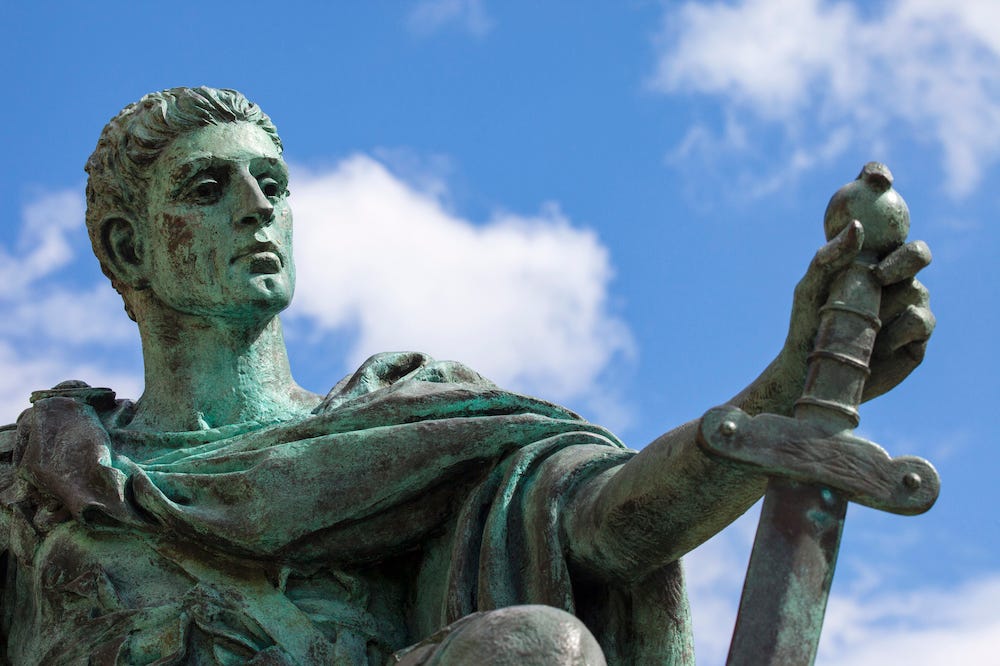Dear Classical Wisdom Members,
The first mosque I saw was so impressive, I thought surely it must be the Hagia Sophia... or the Blue Mosque. But then I saw another floating dome and soaring minarets... and another... and another.
Clearly there is no better way to appreciate the imperial nature of Istanbul than flying into the city, viewing its grand buildings and pulsing population from above.
Indeed, Istanbul has the distinguished accolade of having been an imperial city for 1600 years.
With people living there since the 6th millennium BC (and that includes a native Thracian population dating the early 1st millennium BC), the town only turned the city of Byzantium in the 7th century BC when Greek colonists from Megara built an acropolis adjacent to the Golden Horn on the site of the early Thracian settlements.
It started its illustrious Imperial era, however, much later in 324 AD, when the newly crowned Roman Emperor, Constantine the Great, laid out the plans for a new, Christian city to replace Byzantium.
It was at this moment it became Constantinople.
It continued to be the capital during the Roman/Byzantine (330–1204), Latin (1204–1261), late Byzantine (1261–1453), and Ottoman (1453–1922) empires.
Of course the era of which we concern ourselves in these humble pages focuses more on those earlier time periods (though the marker to determine the ‘end’ is certainly fodder enough for a full discussion of its own), so today we’d like to look at the most famous man to be associated with this epic city. Indeed, it bore his name for over 1600 years.
When discussing Constantine the Great, however, many important questions must be addressed. When, if ever, did Constantine begin to truly believe? If he did, what caused the conversion? If he didn’t, why move the empire away from paganism and towards monotheism?
Moreover, just how much did Constantine turn the religious tide of the entire empire? His legacy is almost impossible to comprehend and may, indeed, be grander, more pervasive and of greater significance than any individual who has ever lived.
Big claim... but certainly possible.
So today’s Classical Wisdom Member’s in-depth article delves into the conversion of Constantine, below.
That’s not all! Members, you can also read Vita Constantini: The Life of Constantine and learn about the man, his politics, his religion, his biographer (as well as the original text), in our Ebook, here:
Please feel free to discuss in our comments below!
All the best,
Anya Leonard
Founder and Director
Classical Wisdom
The Conversion of Constantine
By Ben Potter
There was probably a point in the childhood of everyone who was either born Christian or into a Christian community when they asked the, seemingly very complex, question: “why are we Christian and not (insert religion)”?
Answers could have run along the lines of “just because”, or “because God loves (insert name of your country)”, or “because of so many reasons – but you’re too young to fully understand”, or, at my school at least, “because… be quiet and finish your work”.
Though, if you were reared in an environment particularly sympathetic to the teaching of classical civilization, then you may have received the straight, simple answer: “Constantine”.
Yes, because of the emperor Constantine the Great (c.272 – 337 AD) Rome, and therefore most of Europe, became Christian. Thereafter the future European empires went on to dominate the wider world, and the virulence of Christianity pervaded its way into countless nooks and crannies of our terrestrial plane.
As with all generalized explanations there are many nuances herein ignored. However, unlike many generalizations, this one (in the vast majority of cases) still holds up to closer scrutiny.
But let’s get back to first causes: the conversion of Constantine – when, where and why did it happen?





